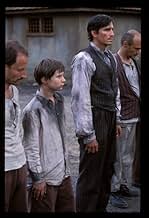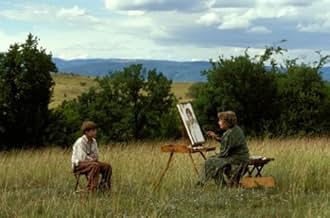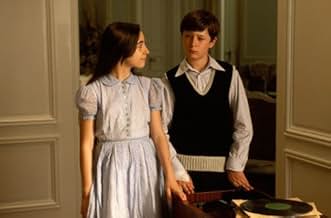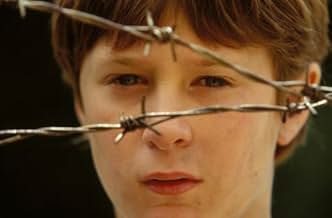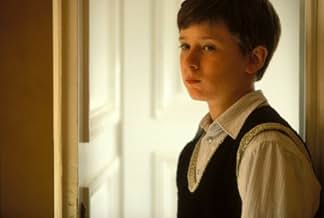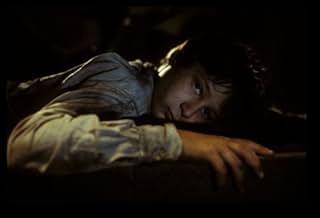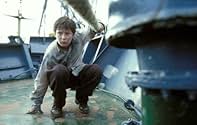IMDb RATING
7.1/10
8.4K
YOUR RATING
A twelve-year-old boy escapes from a Bulgarian Communist concentration camp and sets out on a journey to reach Denmark.A twelve-year-old boy escapes from a Bulgarian Communist concentration camp and sets out on a journey to reach Denmark.A twelve-year-old boy escapes from a Bulgarian Communist concentration camp and sets out on a journey to reach Denmark.
- Awards
- 8 wins & 1 nomination total
Krasimir Kutzoparov
- Camp Officer
- (as Krassimir Kutzuparov)
Diyan Machev
- Party Guest
- (as Deyan Machev)
- Director
- Writers
- All cast & crew
- Production, box office & more at IMDbPro
Featured reviews
In 1952, the polyglot twelve year-old David (Ben Tibber), who was raised in the Communist Belene Prison Camp in Bulgaria, witnesses the death of his friend and protector Johannes (Jim Caviezel) and escapes from the concentration camp in the night. He is advised to mistrust everybody and together with a piece of bread, a compass, a piece of soap, a jackknife and a sealed envelope to be delivered in Denmark, he travels though Greece and Italy heading North. Along his journey, David discovers the beauty of the world and slowly he changes his behavior with people. When he meets Sophie (Joan Plowright), an old lady that lives in Switzerland and likes to paint as hobby, she asks David to paint his face; later she invites David to have lunch with her in her house, and David finally discloses his quest to her.
"I Am David" is a magnificent journey to the goodness of people. The expressive Ben Tibber has a stunning performance in the role of the boy David, who was raised confined in a concentration camp and surrounded by cruelties, that begins to smile and trust people along his travel through Europe. It is amazing how this young actor is able to transmit these sensations and emotions through his face and eyes. Joan Plowright performs a wise old woman that teaches David that most of the people are good and opens his heart. The direction, performances, cinematography, locations, pace, message etc., everything works perfectly in this great movie. Last but not the least, the conclusion is heartbreaking. My vote is nine.
Title (Brazil): Not Available
"I Am David" is a magnificent journey to the goodness of people. The expressive Ben Tibber has a stunning performance in the role of the boy David, who was raised confined in a concentration camp and surrounded by cruelties, that begins to smile and trust people along his travel through Europe. It is amazing how this young actor is able to transmit these sensations and emotions through his face and eyes. Joan Plowright performs a wise old woman that teaches David that most of the people are good and opens his heart. The direction, performances, cinematography, locations, pace, message etc., everything works perfectly in this great movie. Last but not the least, the conclusion is heartbreaking. My vote is nine.
Title (Brazil): Not Available
I have read Anne Holm's I am David dozens of times since I first stumbled upon it as a 12 year old. It has been one of those novels that have remained with me, not just the pages, not just the story, but the way it has moved me and guided many of my decisions in life. I personally empathised with David, having been an abused child and when at 13 I became a state ward, the impossibility of trusting others to care for me were mirrored in David's own situation. This just to demonstrate how significant this work has been in my own development and connected I am with David's story.
When I heard there was a film made of this story, I was suspicious that it could not hope to reach the depths of the novel, particularly as one of the fundamental points of the novel had been changed and primarily because much of the 'action' in the novel occurs inside David's mind.
The film is significantly different to the novel in a few key details and yet it has managed to capture the essential soul of the novel, something I applaud and profoundly appreciate. Whilst the means of achieving the result is different, I was still left, as I always am when I read the story, with a deep sense of truth and love winning out over darkness and hatred. I was moved to tears once again and for all the same reasons and for that I would just like to say thank you to those involved.
I could not recommend this novel or film more deeply, particularly to those who's lives have been controlled by others who don't have their best interests at heart and who feel unable to regain control themselves. This above all things is a tribute to the ability of one who has no control and no idea how to gain control of their own lives succeeding in just that, without use of force, without manipulation or dishonesty, but simply with conviction that the goal must be achieved for whatever reason, because to not achieve it is to invite death and darkness upon yourself and upon all you touch in your life.
When I heard there was a film made of this story, I was suspicious that it could not hope to reach the depths of the novel, particularly as one of the fundamental points of the novel had been changed and primarily because much of the 'action' in the novel occurs inside David's mind.
The film is significantly different to the novel in a few key details and yet it has managed to capture the essential soul of the novel, something I applaud and profoundly appreciate. Whilst the means of achieving the result is different, I was still left, as I always am when I read the story, with a deep sense of truth and love winning out over darkness and hatred. I was moved to tears once again and for all the same reasons and for that I would just like to say thank you to those involved.
I could not recommend this novel or film more deeply, particularly to those who's lives have been controlled by others who don't have their best interests at heart and who feel unable to regain control themselves. This above all things is a tribute to the ability of one who has no control and no idea how to gain control of their own lives succeeding in just that, without use of force, without manipulation or dishonesty, but simply with conviction that the goal must be achieved for whatever reason, because to not achieve it is to invite death and darkness upon yourself and upon all you touch in your life.
Europe is one of the most complicated places on Earth. There are good countries and there are some bad ones. Set in one notorious police state, is Anne Holm's touching story called " I am David. " He is a Dutch boy (Ben Tibbler) who's parents were arrested and imprisoned when he was too young to remember why. At the age of twelve he is befriended by Johannes (James Caviezel) a fellow prisoner who mentors' the boy in the enduring nature of man as he is growing up amid the cruel, barbarous, atmosphere of a harsh Bulgarian Prison camp. Thereafter he is instructed by 'the man' (Hristo Shopov) who is a sympathetic officer risking all to help the boy. With a knapsack containing a few essentials, the boy narrowly escapes and begins a harrowing thousand mile trek towards his homeland in Denmark. During the arduous journey, the boy reflects on the horrendous treatment he and the other prisoners suffered at the hands of guards. Then too, he slowly realizes the open kindness of others as he makes his way across Europe. Eventually, he meets Sophie (Joan Plowright) a lonely swiss woman who discovers who the boy really is and helps to send him home, but not before allowing her to find a bit of solace in his eyes. The film is a wonderful college of dark images, illuminated by the bright rays of hope and panoramic scenery. Easilly recommended as a movie dedicated to the spiritual humanity of all good people. ****
This is the sort of film that claims merit in allowing you to see a bad situation work out in tear-induced happiness. Its a sort of enigma why there is a market for these; I suppose we all carry unresolved injustices in our hearts and like to see the promise of them resolved. In getting this, we gloss over the mechanics. For instance this has gotten an award from some morality institute though you'd be hard pressed to find anything or character in it that is actually an exemplar.
There's determination, and there's resolution, and somehow we superimpose admiration on the participants.
The really fascinating thing about this is that it really is two films: a long first part, followed by a quite different second part.
The first part follows a boy's escape. There actually is little to say other than this small bit, he escapes, and continues escaping.
The second part finds him with Joan Plowright and takes us to the resolution.
These two parts are from completely different cinematic worlds. It is true that many movies are remembered only for their ending and viewers will forgive all sorts of clunks in the journey if they recall the end fondly. But this first part clunks like old ball bearings in soup. There's one unnecessarily improbable escape after another. Each one adds nothing, except to underscore the difficulty of what our hero is doing. But that difficulty gets undermined at every turn. He never seems hungry, in pain, in the least uncomfortable. He always "gets away." None of the characters or places touch him in any way.
It seems as if the writer is putting us through this long process for only one reason, so that we can get a large number of flashbacks, each one revealing a little more of what becomes the real story. I'm prepared for indirect narrative; its an amazingly effective tool that I study. Here, we sort out the sense of the thing as he does.
But the container of this first part is so sickly sweet almost every viewer will give up, unless you live in a world of Sunday School cartoons.
The second part is as competent as the first is incompetent. Here, we harvest all the information we have been given in the flashbacks. Plus we have a real actor involved instead of folks who believe beatified shining is acting.
Here;s where we get three twists in the narrative, one large. And there's the hint that our boy is an illicit child, and the complications that brings. Its almost enough to make this watchable. But that first part puts us in a prison we cannot escape.
Ted's Evaluation -- 2 of 3: Has some interesting elements.
There's determination, and there's resolution, and somehow we superimpose admiration on the participants.
The really fascinating thing about this is that it really is two films: a long first part, followed by a quite different second part.
The first part follows a boy's escape. There actually is little to say other than this small bit, he escapes, and continues escaping.
The second part finds him with Joan Plowright and takes us to the resolution.
These two parts are from completely different cinematic worlds. It is true that many movies are remembered only for their ending and viewers will forgive all sorts of clunks in the journey if they recall the end fondly. But this first part clunks like old ball bearings in soup. There's one unnecessarily improbable escape after another. Each one adds nothing, except to underscore the difficulty of what our hero is doing. But that difficulty gets undermined at every turn. He never seems hungry, in pain, in the least uncomfortable. He always "gets away." None of the characters or places touch him in any way.
It seems as if the writer is putting us through this long process for only one reason, so that we can get a large number of flashbacks, each one revealing a little more of what becomes the real story. I'm prepared for indirect narrative; its an amazingly effective tool that I study. Here, we sort out the sense of the thing as he does.
But the container of this first part is so sickly sweet almost every viewer will give up, unless you live in a world of Sunday School cartoons.
The second part is as competent as the first is incompetent. Here, we harvest all the information we have been given in the flashbacks. Plus we have a real actor involved instead of folks who believe beatified shining is acting.
Here;s where we get three twists in the narrative, one large. And there's the hint that our boy is an illicit child, and the complications that brings. Its almost enough to make this watchable. But that first part puts us in a prison we cannot escape.
Ted's Evaluation -- 2 of 3: Has some interesting elements.
Loved the Movie! One of the most faithful renditions of a book to screen....gripping adventure....wonderful scenery, great characters, heartfelt acting, both funny and sad at the same time. Beautiful Photography, many of the scenes would be great standalone still photos. Felt like I went on vacation in Europe watching this picture. About time we have a movie without gratuitous sex and violence, and a break from reality programming, that has come to the point of offering live, real-time war as an option. Am surprised that many of the professional reviews seem to have been written by people with no background for this type of movie, and just don't get it. Waiting to see more from this director, Paul Feig.
Did you know
- TriviaStewart Copeland, drummer for rock band The Police, composed the soundtrack for this movie. For inspiration, he immersed himself in Eastern European Gypsy and folk music.
- GoofsWhen Maria shows David a globe, David asks her to show him Denmark. The camera focuses on Denmark, then traces down the globe to Italy. Though antique in appearance, modern country names on the globe (Czech Republic, Slovakia, Bosnia) show it dates at least from 1993.
- ConnectionsReferenced in The Benchwarmers (2006)
- SoundtracksRuphinka is Taken Ill
Written by Kosta Kolev
Performed by Vesselin Djigov
Courtesy of Bulgarian National Radio
- How long is I Am David?Powered by Alexa
Details
Box office
- Gross US & Canada
- $288,552
- Opening weekend US & Canada
- $160,346
- Dec 5, 2004
- Gross worldwide
- $329,577
- Runtime1 hour 30 minutes
- Color
- Sound mix
- Aspect ratio
- 1.85 : 1
Contribute to this page
Suggest an edit or add missing content




